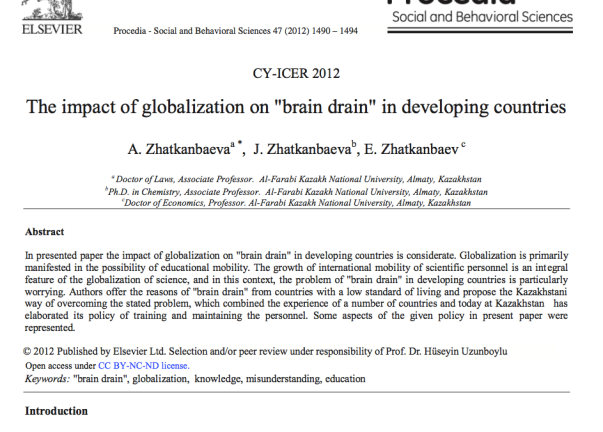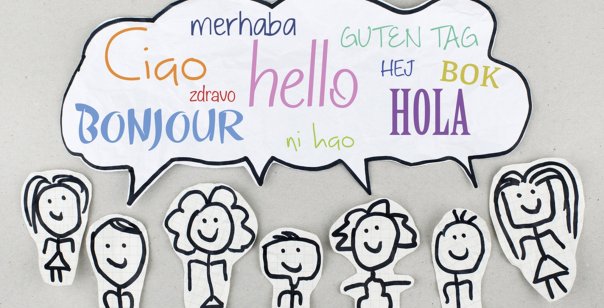
Retrieved from https://www.sciencedirect.com/science/article/pii/S1877042812025840
The scholars from one of the Kazakhstani universities Zhatkanbaeva, A., Zhatkanbaeva, J., and Zhatkanbaev, E. (2012) published their analysis of brain drain with the title “The impact of globalization on “brain drain” in developing countries”. They claim that brain drain causes complication to the developing countries asserting that “the problem of “brain drain” is considered as a threat to national security” (p. 1490). To solve it, they recommend to recognize brain drain as a problem and reform the educational system. I appreciate that scholars have their recommendations on solving this controversial issue, despite the lack of supporting details and justifications for their claim. Seems that their thesis statement is not clearly structured in the introduction which consists of three paragraphs with separate ideas that resulted in the loss of the main idea. Moreover, the lack of roadmap made the article even vague.
While reading it for the first time, some incomprehensible details appeared that could have been improved or prevented. Firstly, the article is not about “developing countries” as it was stated in the title. But only about Kazakhstan. It might be suggested to use the exact context in the title to make it distinct. Secondly, the definitions of major concepts are missing. As the paper analyses the concept of “brain drain”, it is useful to consider defining the term first. Thirdly, the article comprises a list of obscure details and ideas that make the work feeble. For instance, the first three paragraphs of “Heading styles” (I suppose, it to be a body paragraph), where the word “erudite” was thoroughly defined. The scholars jump from one idea to another without ending the first one. If you remember, the introduction was opened with the “globalization of education”, whereas, the body also contains some general information about globalization which could have been mentioned in the introduction. It could be the case to remind that “a sentence should contain no unnecessary words, a paragraph no unnecessary sentences” (Struck & White, 2000, p. 23). Moreover, the scholars keep repeating some words, phrases and even sentences to emphasize its importance as in: “accommodation and flats” and “perspectives of career growth and position” (p.1492). The below given two sentences might show the repetition of weakly paraphrased sentences and an irrelevance to the context. The first excerpt is written in the introduction and the second one in the main body. Although the relevance to the context might be negotiated, both excerpts devoid of further clarifications in the kind of measures that make these statements deceptive.
“Kazakhstan has been taking a series of comprehensive measures of a legal, social and organizational character. What is worth speaking about is the formation of Kazakhstan’s way based on the experience of different countries to overcome this problem” (p. 1490).
And
“Kazakhstan undertakes a number of complex measures of legal, social and organizational character. We should mention the formation of Kazakhstan way of overcoming the stated problem, which combined the experience of a number of countries” (p. 1492).
The other things I have to mention are the assumptions and a lack of justifications for their claims in the statements. Let’s have a look at some of them:
“The problem of “brain drain” is considered as a threat to national security” (p. 1490).
I agree that brain drain probably brings some economic, social and educational problems to the country. But to argue it to be a “national threat” without any clarifications of why should it be a threat and without any justifications to support makes it a feeble argument.
“We have to state that schools and universities provide only the basic education” (p. 1491).
Zhatkanbaeva et al. (2012) assumed that schools and universities provide only basic education based exclusively on their teaching experience in the university. Although it might be true to some extent, the statement cannot be generalized to all schools and universities without any research done to support it.
“[Developing countries’ curriculum] … does not meet the international standard requirements, although these requirements do not exist” (p. 1492).
The other statement which is worth to mention. It seems that scholars again speak from their perspective, based on their experience of living in a developing country. The first assumption made is the developing countries’ curriculum which does not correspond the international standards, could have been explained in what way it does not meet it. However, I would argue that those reform changes that the government makes aim to fit those international standards. The other speculation is rejecting those “international standards”, here, they contradict their own words.
The article is written from the first person. The scholars mostly use “we” to refer to themselves in their recommendations and use their personal and work experiences in making the examples, not evidence.
I guess that intended audience of this article are students and educators. The scholars presented their work mostly based on their practice without intelligible explanations and pieces of evidence to support their claims. After reading the article I wasn’t convinced at all with its content, rather got confused with their ideas, where they argue that “educational international standards do not exist”, on the other hand, they asserted that “Kazakhstan reforms its educational system based on the experience of different countries to overcome problems”. I greatly admire their effort in analyzing one of the debatable issues of our society, but to improve their article, I would advise to totally rewrite the introduction, body paragraphs, and write concluding paragraph (which is missing), support it with credible pieces of evidence and of course, to avoid making assumptions and bias. And remember to find a reliable peer-reviewer that makes the writing more credible.
How do you think this article could be improved?
References
Strunk, W., & White, E.B. (2000). The elements of style (4th ed.). Longman
Zhatkanbaeva, A., Zhatkanbaeva, J., & Zhatkanbaev, E. (2012). The impact of globalization on “brain drain” in developing countries. Procedia – Social and Behavioral Sciences 47, 1490 – 1494. doi:10.1016/j.sbspro.2012.06.848




